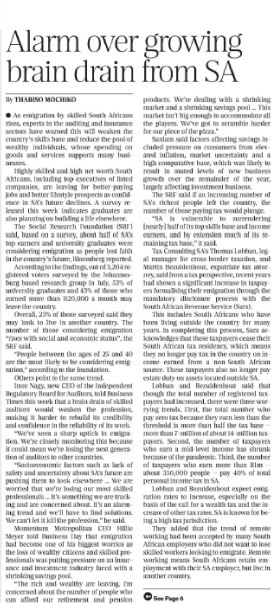ALARM OVER GROWING BRAIN DRAIN FROM SA
As emigration by skilled South Africans rises, experts in the auditing and insurance sectors have warned this will weaken the country’s skills base and reduce the pool of wealthy individuals, whose spending on goods and services support many businesses.
Authors
Thomas Lobban
Legal Manage: Cross-Border Taxation
&
Martin Bezuidenhout
Expatriate Tax Attorney
As emigration by skilled South Africans rises, experts in the auditing and insurance sectors have warned this will weaken the country’s skills base and reduce the pool of wealthy individuals, whose spending on goods and services support many businesses.
Highly skilled and high net worth South Africans, including top executives of listed companies, are leaving for better paying jobs and better lifestyle prospects as confidence in SA’s future declines. A survey released this week indicates graduates are also planning on building a life elsewhere.
The Social Research Foundation (SRF) said, based on a survey, about half of SA’s top earners and university graduates were considering emigration as people lost faith in the country’s future, Bloomberg reported.
According to the findings, out of 3,204 registered voters surveyed by the Johannesburg-based research group in July, 53% of university graduates and 43% of those who earned more than R20,000 a month may leave the country.
Overall, 23% of those surveyed said they may look to live in another country. The number of those considering emigration rises with social and economic status”, the SRF said. “People between the ages of 25 and 40 are the most likely to be considering emigration,” according to the foundation. Others point to the same trend. Imre Nagy, New CEO of the Independent Regulatory Board for Auditors, told Business
Times this week that a brain drain of skilled auditors would weaken the profession, making it harder to rebuild its credibility and confidence in the reliability of its work. “We’ve seen a sharp uptick in emigration. We’re closely monitoring this because it could mean we’re losing the next generation of auditors to other countries.
“Socioeconomic factors such as lack of safety and uncertainty about SA’s future are pushing them to look elsewhere… We are worried that we’re losing our most skilled professionals… It’s something we are tracking and are concerned about. It’s an alarming trend and we’ll have to find solutions.
We can’t let it kill the profession,” he said. Momentum Metropolitan CEO Hillie Meyer told Business Day that emigration had become one of his biggest worries as the loss of wealthy citizens and skilled professionals was putting pressure on an insurance and investment industry faced with a shrinking savings pool.
“The rich and wealthy are leaving. I’m concerned about the number of people who can afford our retirement and pension products. We’re dealing with a shrinking market and a shrinking savings pool…
This market isn’t big enough to accommodate all the players. We’ve got to scramble harder for our piece of the pizza.” Salam said factors affecting savings included pressure on consumers from elevated inflation, market uncertainty and a high comparative base, which was likely to result in muted levels of new business growth over the remainder of the year, largely affecting investment business.
The SRF said if an increasing number of SA’s richest people left the country, the number of those paying tax would plunge. “SA is vulnerable to surrendering [nearly] half of its top skills base and income earners, and by extension much of its remaining tax base,” it said.
Tax Consulting SA’s Thomas Lobban, legal manager for cross-border taxation, and Martin Bezuidenhout, expatriate tax attorney, said from a tax perspective, recent years had shown a significant increase in tax pavers formalising their emigration through the mandatory disclosure process with the South African Revenue Service (SARS).
This includes South Africans who have been living outside the country for many years. In completing this process, SARS acknowledges that these taxpayers cease their South African tax residency, which means they no longer pay tax in the country on in- come earned from a non-South African source.
These taxpavers also no longer pay estate duty on assets located outside SA. Lobban and Bezuidenhout said that though the total number of registered taxpayers had increased, there were three worrying trends.
First, the total number who pay zero tax because they earn less than the threshold is more than half the tax base more than 7 million of about 14-million taxpayers. Second, the number of taxpayers who earn a mid-level income has shrunk because of the pandemic. Third, the number of taxpayers who earn more than Rim about 350,000 people – pay 40% of total personal income tax in SA.
Lobban and Bezuidenhout expect emigration rates to increase, especially on the basis of the call for a wealth tax and the increase of other tax rates. SA is known for being a high tax jurisdiction.
Thev added that the trend of remote working had been accepted by many South African emplovers who did not want to lose skilled workers looking to emigrate. Remote working means South Africans retain employment with their SA employer but live in another countrv.
FEATURED IN:

